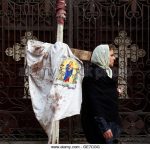By Coptic Solidarity –
March 21, 2017
Coptic Solidarity calls on President Trump to include human rights in all levels of discussion with President El-Sisi during his imminent visit to Washington, DC. All too often, human rights issues are sacrificed to other priorities such as national security, combating terrorism, or trade and development. These issues are not mutually exclusive, nor should they be treated as such. To the contrary, ensuring human rights is an effective tool in combating Islamic fundamentalist ideologies and terrorism and enhancing economic development.
It would not be surprising if president El-Sisi presented a whitewashed image of tolerance and equality in Egypt. Yet, he has overseen an even greater crack-down on civil liberties and human rights than was waged under the Mubarak regime. NGOs and civil society organizations have been closed. Journalists have been muzzled. The “deep state” or intelligence and internal security have infiltrated the media to ascertain that they toe the government’s line. Copts treatment as second class citizens continues to be firmly institutionalized.
Coptic Solidarity welcomes closer cooperation between Egypt, and the new U.S. administration. President Trump has no qualms about naming Islamic terrorism for what it is, and making the defeat of Islamic fundamentalist ideology, which breeds terrorism, a national security issue and a high priority for his administration. This is good news for Egypt who has been waging an ongoing fight against organizations such as the Muslim Brotherhood – with its fundamentalist violent Islamist ideology -, and against the home-grown Egyptian branch of the Islamic State in northern Sinai. Coptic Solidarity urges President Trump to adopt an approach towards Egypt that uses human rights as a tool, among other means, to combat terrorism. In this regard, emphasizing civil society and human rights, particularly that of Egypt’s minorities, is vital given the importance of Egypt’s stability to the region.
Copts in Egypt are experiencing an unprecedented rise in attacks against their persons and property in the past two years, unseen even during the rule of Mubarak or Morsi. In collaboration with Eshhad Project of the Tahrir Institute for Middle East Policy, Coptic Solidarity has compiled a list of over 30 significant cases of violence against Copts in Egypt, which have occurred in just the last six months. While this compilation is by no means comprehensive, it provides only a sampling of the grotesque attacks, killings and destruction of property endured by Egypt’s Copts under Mr. El-Sisi’s rule. Despite its complicity in many of the cases of violence against Copts, the Egyptian government continues to blame foreign terrorism. The brutal bombing attack against St. Peter and St. Paul Church on December 11, 2016 in Cairo, which resulted in the deaths of 28 Copts and the injury of over 40 individuals, is a case in point. However, attacking Coptic churches has occurred numerous times in recent years by Egyptian Muslims without sufficient protection for Copts, or prosecution of the perpetrators. This violence is not a foreign problem, but is homegrown, one created by a culture of hate and impunity within Egypt.
This rise in violence is only a symptom, and its underpinnings need to be understood; namely the rise of Islamic fundamentalist ideologies that have infiltrated almost every aspect of the Egyptian society, bred a culture of hate over the past four decades and institutionalized discrimination against Copts. Ultimately, Copts have been thoroughly marginalized in Egyptian society, are treated as second-class citizens in their own country, and face discrimination in every aspect of daily life.
Islamic fundamentalist ideologies are reinforced by state-backed compulsory educational curricula, and state-backed media instill hate of the other (minorities). Extremist ideas have gained a greater grip as President El-Sisi has given a free reign to Salafists to pursue their fundamentalist teachings and ideology in Egypt since the demise of the Muslim Brotherhood. This comes in addition to the institutionalized marginalization of the Copts in virtually every state institution; the cabinet, the national security council, the armed forces, the police, the state security apparatuses, foreign service or ambassadorships, the judiciary, and in academia. Copts in these institutions are either totally absent of seriously under represented, except for a few symbolic positions.
The existing culture of hate has evolved to justify attacks on Christians. Internal security forces rarely intervene to protect Coptic victims of violence or stop attacks. While an attack is in progress, security forces are typically slow to respond or stand by watching until the violence has run its course and the damage is complete. In the majority of cases, the justice system lets perpetrators of violence go unpunished, thus creating a culture of impunity and encouraging more attacks. Much has been reported on the forced “reconciliation meetings” held after Muslim attacks on Copts. During these meetings, which are presided over by representative of the authorities that are supposed to protect all citizens equally, Coptic victims of violence are forced under threats of harm and intimidation to themselves and to their families to drop charges against their Muslim attackers. These meetings make a mockery of justice. At times, Coptic victims of violence are forced to vacate their homes under the guise of keeping the peace. Under Mr. El-Sisi’s rule, the Egyptian state continues to fail to protect the Copts, render them justice or compensate them for damages.
Kidnapping Copts for ransom has been a recent phenomenon, but kidnapping, or luring, and forced conversion of Coptic underage girls has been an ongoing phenomenon for years and increased lately. These incidents are reinforced by the collusion between internal security authorities and Al-Azhar. Parents are refused meeting their loved ones, attorneys are denied meeting with the kidnapping victims to get their side of the story, and the forced conversion is sanctioned by religious and state authorities.
The hate culture and religious bigotry are also expressed in the application of the “anti-blasphemy” law, which uses religion to restrict freedom of speech and oppress the other. Although created under the guise of protecting religion, it is only applied to protect Islam, often times due to false allegations. Daily attacks on Christian beliefs by Islamists in the media and in mosques go unpunished. Under age school children are arrested under anti blasphemy law even when mocking beheadings perpetrated by ISIS (to date, Al-Azhar has refused to condemn the violence perpetrated by ISIS). The number of cases of anti blasphemy law during the rule of Mr. El-Sisi has exceeded those during all his other predecessors.
Copts have to obtain a special permit to build a new church or even repair an old one. A proposed unified houses of worship law was rejected due to opposition by Al-Azhar since it would put churches on equal footing with mosques. The new church construction law passed in August 2016 to regulate the construction and repair of churches is replete with restrictions and loopholes that effectively prevent Copts from building churches. Churches are considered “a security risk,” and obtaining a church building permit requires clearance by the oppressive security apparatus and approval by the local Muslims. Christians in the hometown village of the majority of the 20 Coptic martyrs that ISIS killed in Libya could not build a church to commemorate them. Muslims in the village would not allow it and the church was eventually built at the outskirts of the village Such is the culture of hate. Scores of churches that were previously closed by the internal security organization have remain closed during the rule of El-Sisi, and internal security forces continue to attack peaceful worshipers who dare pray “without permit.”
Recently, over 355 Christian families (about 1300 individuals been forced to flee their homes in Arish, after the recent horrific killings of Christians in northern Sinai by home grown Islamic terrorists. Their homes and valuables have been ransacked and appropriated by Muslims. Egypt’s government failed to respond to the crisis, and belatedly promised the refugees a speedy return which they know will not be accomplished. Islamists would not have dared to expel Copts from Sinai if it were not for the precedent set by dozens of prior cases in which Copts were targeted across Egypt, always sanctioned by the authorities. The Egyptian government failed in its duty to protect its Coptic citizens underscoring their second-class status as those unworthy of protection.
At this point, even some Egyptian Muslims have lamented that discrimination and hate are a core part of Egyptian public education, which fuels the fire of increased violence against Copts. Al-Azhar, the leading Sunni Islamic institution has resisted Mr. El-Sisi’s call to moderate religious discourse. The symbolic gestures by president El-Sisi visiting the Coptic Orthodox Patriarchate during Christmas mass in absence of real significant change in the conditions of the Copts in Egypt are just that, symbolic, and seem to be only intended for public relations to convince Western powers that he is protecting religious minorities in the face of Islamic extremism. Ultimately, it is the responsibility of the government to protect all its citizens and to treat them equally. Beleaguered Copts in Egypt have to choose between supporting the current regime or face potentially worse options. The Coptic Church is under severe pressure by the Egyptian government to acknowledge that its current situation has improved, despite the fact that its members suffer discriminations on a daily basis and an unprecedented rise in violence.
In an effort to improve its image, Egyptian Intelligence reportedly hired two U.S. lobbying firms to “…assist Egypt in promoting its ‘strategic partnership with the United States,’ highlighting its economic development, showcasing its civil society and publicizing Egypt’s ‘leading role in managing regional risks’ in agreements worth $1.8 million annually.” This is in addition to hiring the lobbying firm Glover Park Group at a cost of $2.29 million for 2015. Trump’s administration and federal legislators need to be aware of these efforts to improve Egypt’s image contrary to reality on the ground.
It is critical that the United States stand firm in emphasizing the need for the Egyptian government to respect human rights and in calling for equality of all Egyptians without sacrificing these ideals. It is entirely possible and necessary for the U.S. to simultaneously partner with Egypt to promote development and advance national security while also advocating for minorities oppressed by their own government and society.
Finally, Islamic terrorism and religious bigotry and hatred cannot be defeated without confronting the ideology behind it. America should lead the world in exposing and combating these Islamist ideologies and those who promote them in Egypt, the region, and at home. Coptic Solidarity will continue to monitor developments in Egypt and press for full equality of Copts and all Egyptians.
Coptic Solidarity is an organization seeking to help minorities, particularly the Copts, of Egypt and we support those in Egypt working for democracy, freedom, and the protection of the fundamental rights of all Egyptian citizens. It advocates in cooperation with the affiliated organizations in Canada and in Europe (Solidarité Copte). For more information, contact Lindsay Vessey at 801-512-1713 or coptadvocacy@copticsolidarity.org
_______________________
Photo credit: National Review





